Gum disease a silent epidemic
“Gum disease is a major health problem as 60-80% of the population in industrialized countries suffer from gingivitis (bleeding gums) and 10-20% suffers from periodontitis (tooth loss)”
BioGaia Prodentis is special!
It provides a balanced oral microbiota and as an adjunct for oral health and prevention of:
• Gingivitis
• Periodontitis
• Plaque
• Peri-Implantitis
• Halitosis (bad breath)
• Oral Candida
• Caries


BioGaia Prodentis contains the natural bacterium Lactobacillus reuteri Prodentis DSM 17938 and Lactobacillus reuteri ATCC PTA 5289, which were derived from human breast milk and saliva.
BioGaia Prodentis has been tested and proven effective through more than 50 clinical studies and suitable for adults, the elderly and pregnant women.
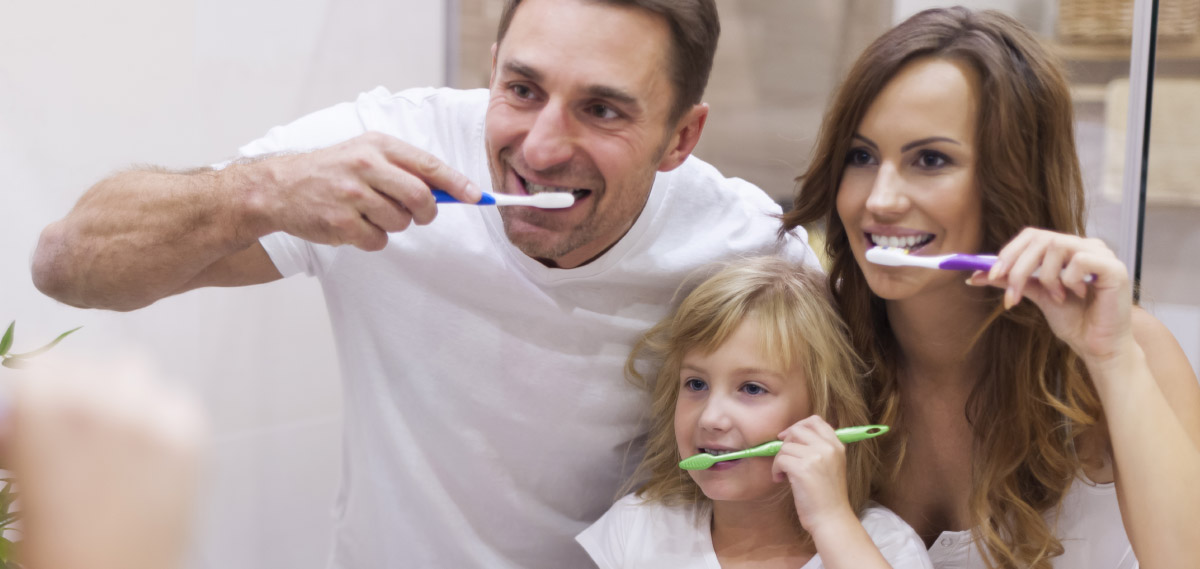
Gum Disease
3 of 4 adults will experience gum disease during their lifetime.
Gingivitis is a very common problem that is too often underestimated; when gums are red, irritated, swollen or bleed, you have gingivitis. It is mainly caused by plaque bacteria which penetrate and cause inflammation of the gums.

More sensitive with age
Oral health is important throughout life but becomes even more important with increasing age. As we get older the function of the immune system is reduced and there is an increased risk of gingival inflammation, making both teeth and gums oversensitive.
If ignored, gingivitis can turn into periodontitis.
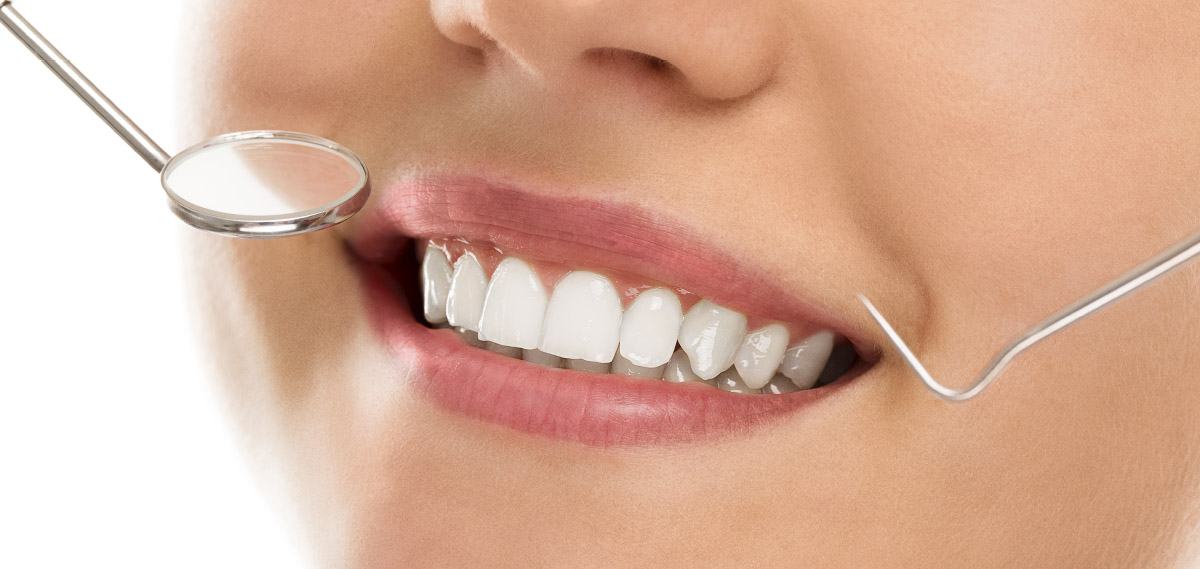
Some signs of gum disease include:
• Bad breath or bad taste in the mouth
• Teeth that seem to be loose or have shifted position
• Gum tissue that is red, swollen and/or bleeds easily (healthy tissue is pink, has an orange peel appearance and does not bleed)
• Pus between teeth and gums (healthy gums are tight around the tooth and do not bleed)

Bacteria from mouth can lead to diseases
A balance of oral bacteria is of vital importance for our health. Bacteria living in your mouth are very close to your blood supply. When the gums are injured, they can bleed, allowing pathogens access to your bloodstream.
When pathogens enter your bloodstream, it can travel throughout your body and infect almost any organ in your body, including your heart.
New research indicates that there is a connection between key bacteria in periodontal disease and many common conditions such as diabetes, obesity, cardiovascular disease and asthma.
It is also an open way to bring harmful bacteria throughout the body, causing systemic diseases such as:
• 2.5 times increased risk of diabetes
• 3 fold increased risk of heart attack
• 7 times increased risk of premature birth and low birth weight

Periodontitis
If gingivitis is not treated in time, there is a risk that it will spread to the bone and ligaments that support the teeth. The gum pockets caused by inflammation become deeper and the bacteria penetrate further down and gradually attack the bone and may result in loosening and subsequent loss of teeth.

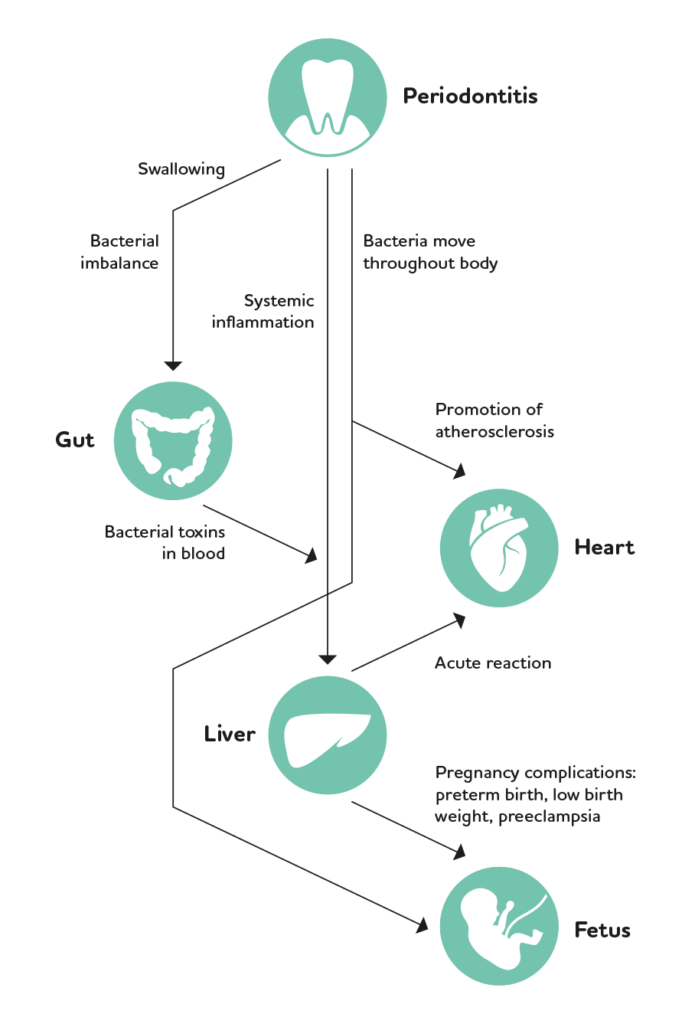
How periodontitis develops
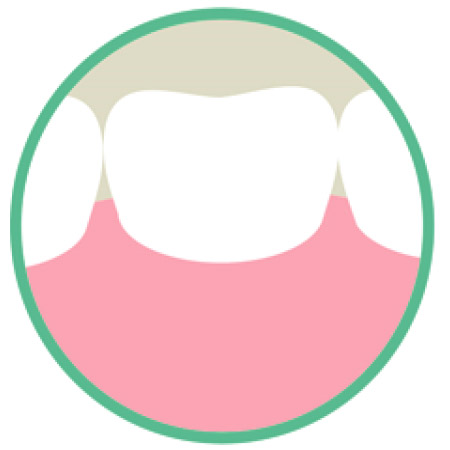
Plaque
Healthy gums are light pink in colour and are tight around each tooth. They do not bleed during brushing or flossing. A bacterial film known as dental plaque is formed continuously on and between the teeth and at the gum line. Plaque consists of microorganisms, salivary proteins, food and beverage residue, and can be formed in only one day. If you do not clean your teeth and gums regularly, the plaque collects and the gums become inflamed.
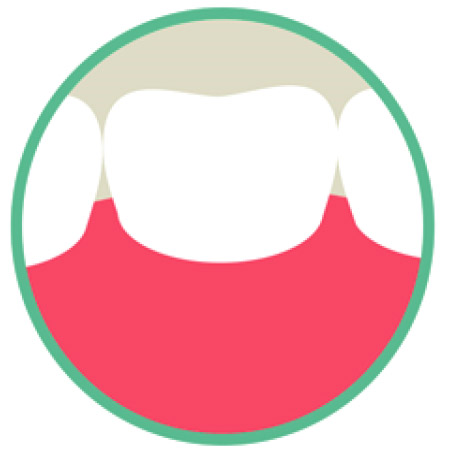
Gingivitis
One early sign of gingivitis is that the gums bleed during brushing or flossing. Inflamed gums can be red and tender, but are most often not painful and can therefore be difficult to detect on your own. The inflammation leads to the formation of a pocket between the tooth and gum.
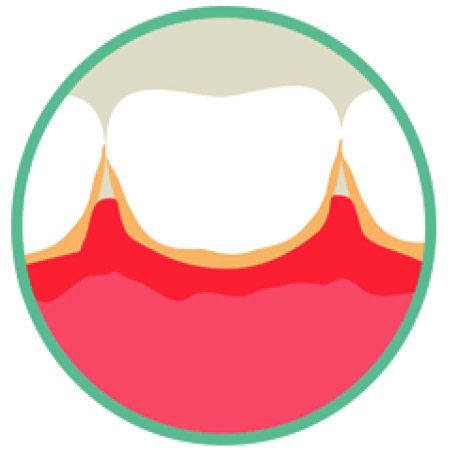
Periodontitis
If gingivitis is not treated in time, there is a risk that it will spread to the bone and ligaments that support the teeth. The gum pockets caused by inflammation become deeper and the bacteria penetrate further down and gradually attack the bone. The tooth looses more and more of its attachment. Gingivitis has now progressed to periodontitis. The progression is slow and often takes place over several years without any apparent symptoms. Professional intervention is necessary to treat periodontitis, otherwise the process will continue and eventually lead to loosening and subsequent loss of teeth.
Caries
Both caries and periodontitis originate from a disturbance in the balance and diversity of the biofilm. Contributing causes may be poor oral hygiene, incorrect diet, stress and/or other factors which affect the oral microflora. Caries is mainly caused by the presence of the bacterium mutans streptococci, which creates a low local pH environment which in turn de-mineralizes enamel.
Halitosis – Bad breath
Bad breath, or halitosis, can occur from time to time or be more or less permanent, depending on the cause. Some of the common causes are poor oral hygiene, periodontal disease, respiratory tract infections or underlying illnesses like diabetes, kidney, liver or reflux disease.
Candidas
Oral candidosis, or Candida-associated stomatitis, is common among the elderly and is often associated with factors such as antibiotic treatment, an impaired immune system, neglected oral hygiene and smoking. In frail elderly patients the condition may be more or less chronic or frequently recurrent and may require long-term or repeated antifungal medication with the risk of resistant strains.

Bacteria and inflammatory periodontal diseases
Under healthy conditions, the mouth is protected by beneficial microflora (“friendly” bacteria) that acts as a defense system against the harmful plaque bacteria responsible for the onset of gingivitis and tooth decay.
However, oral microflora can be weakened by: poor oral hygiene, an incorrect diet, stress, and other factors, which promote the development of pathogenic bacteria (“bad” bacteria) and, consequently, of gum diseases.
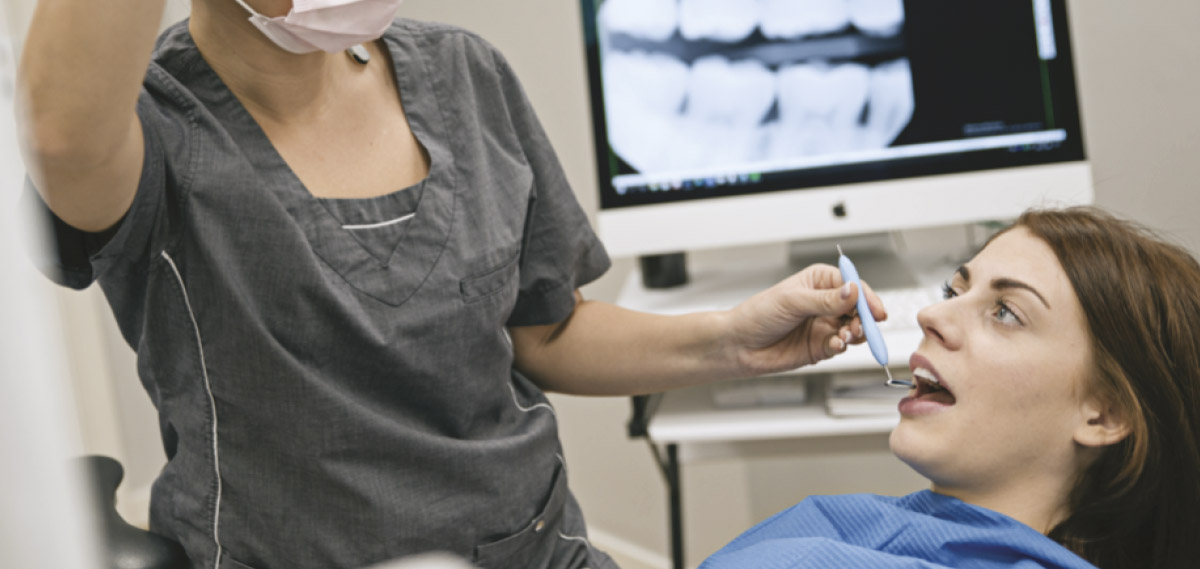
How to prevent Gingivitis and Periodontitis
There is a lot you can do for yourself and a great deal that your oral hygienist or dentist can help you with. The important thing is to get started in time!
Check-up. Your dentist or oral hygienist can determine your pocket depth and the degree of inflammation, and evaluate the condition of the ligaments and bone around the tooth.
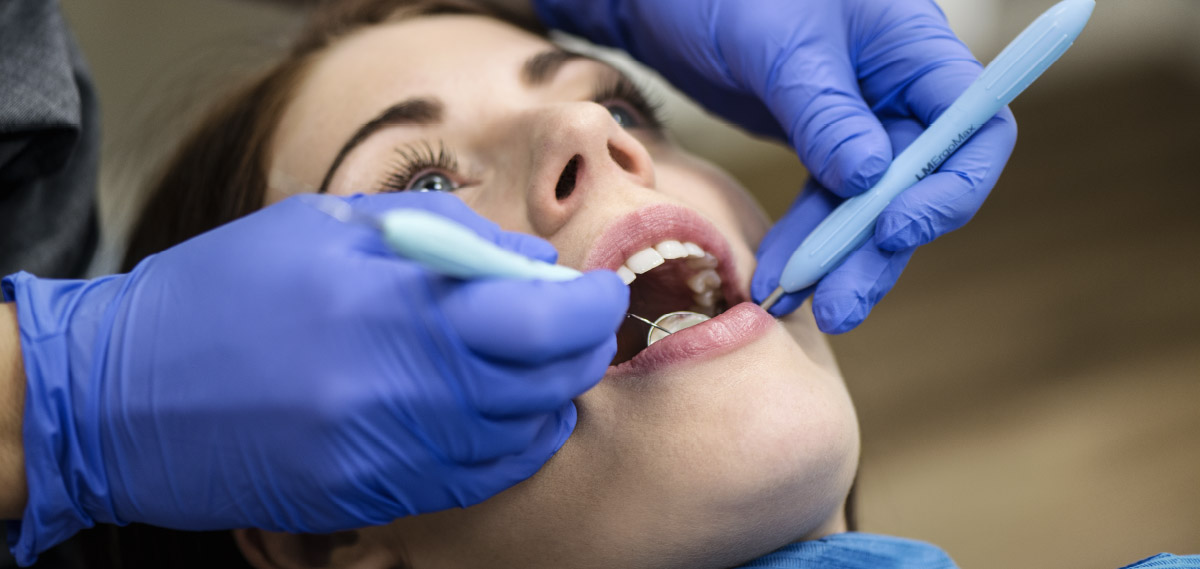
Professional mechanical cleaning
(Scaling and Root Planing: SRP)
The dental hygienist thoroughly cleans the teeth and removes tartar deposits above and below the gum line in order to reduce inflammation and pocket depth. Severe periodontitis cases may require surgical prodecures to clean the teeth and remove infected tissues.
Adjunctive therapy:
SRP with BioGaia ProDentis
A balanced oral microflora is vital for healthy teeth and gums. The oral cavity contains around 800 different species of bacteria and there are more than 1 billion bacteria on each tooth. Under normal conditions, these are in balance and protect you from illness, but in case of inflammatory periodontal disease, such as gingivitis and periodontitis, an imbalance has arisen.
SRP alone cannot remove all the “bad” pathgenic bacteria that causes gum diseases. SRP reduces the amount of bacteria, but only temporarily since the pathogens quickly recolonize the treated areas of the oral cavity.
BioGaia Prodentis contains 2 complementary strains of live “friendly bacteria” Lactobacillus reuteri Prodentis DSM 17938 & ATCC PTA 5289.
They have anti-inflammatory and antimicrobial effects, and inhibit the growth of pathogenic bacteria in the mouth. Studies have shown that the results of SRP can be significantly improved with the concurrent use of BioGaia Prodentis. In addition, the beneficial effects of professional cleaning are maintained longer.
How to complement with your daily oral care?
• Use after daily brushing and flossing
• Just chew one or two lozenges a day
• Lozenges come with a refreshing peppermint flavour and provides the recommended dose of 200-400 million active health-promoting L. reuteri Prodentis bacteria. This regimen helps to reduce the number of periodontal pathogens and cariogens, thereby improving oral health balance
How BioGaia Prodentis works?
Ideal properties of a probiotic intended for use in disorder of the mouth
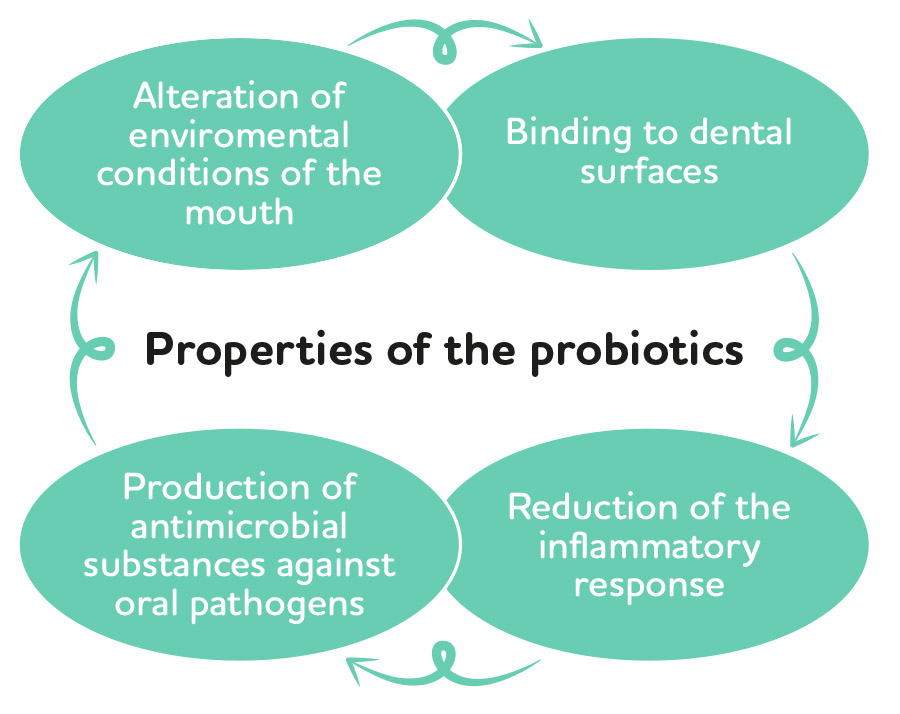
“By taking Prodentis daily it may be possible to restore the good and natural balance in the mouth and recreate the healthy ecology”.
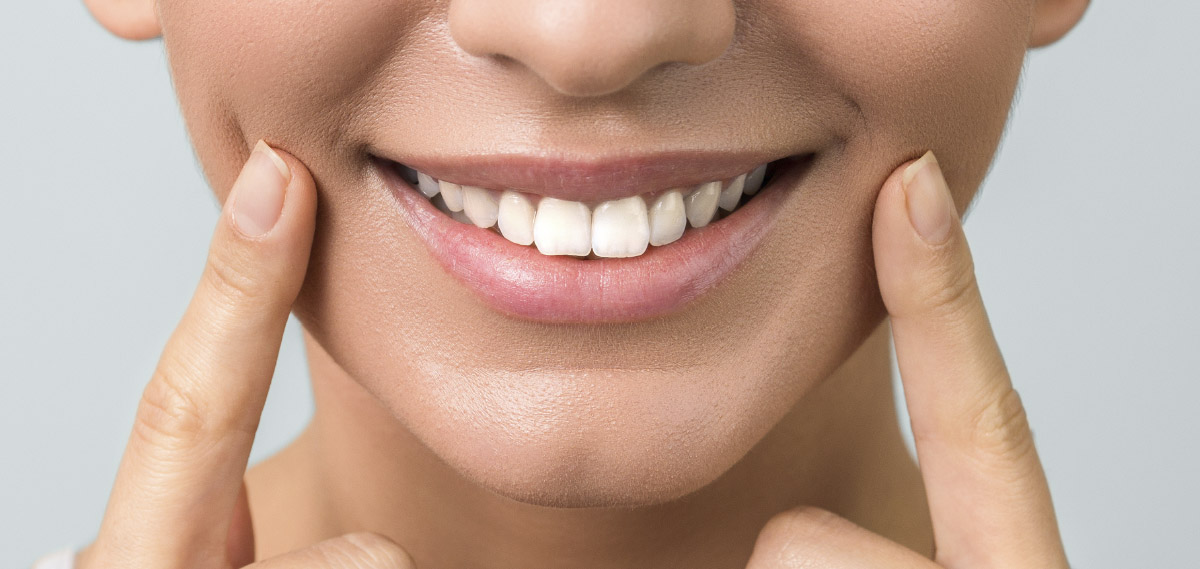
Clinically Proven
Clinical studies with L. reuteri Prodentis (Lactobacillus reuteri DSM 17938 and ATCC PTA 5289) have been shown to reduce gingival inflammation and chronic periodontitis in healthy adults.
85% less bleeding after two weeks
42 healthy adults with moderate gingivitis were randomly assigned to one of the following treatments for two weeks: one L. reuteri Prodentis lozenge per day, two L. reuteri Prodentis lozenge per day, or a placebo. L. reuteri Prodentis lozenge was shown to reduce bleeding and inflammation by 85% after two weeks of supplementation compared to placebo. The patients were followed up after four weeks.

Reduced inflammation of the gums
A clinical trial in 72 adults showed significant improvement in bleeding on probing after 6 weeks of daily supplementation with two lozenges of L. reuteri Prodentis.
Compared to baseline, bleeding on probing was reduced by 30% with L. reuteri Prodentis, while it was increased by 5% in the placebo group. The effect was achieved without any professional cleaning of the teeth or instructions regarding oral hygiene routines.
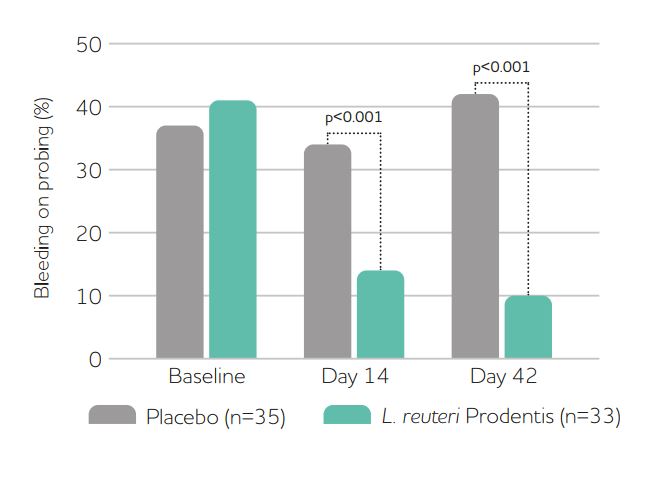
47% fewer tooth surfaces need surgery
After professional cleaning patients were given either two lozenges per day of L. reuteri Prodentis or placebo for 12 weeks. The effects on pocket depth reduction and attachment gain were significantly better with L. reuteri Prodentis compared to placebo. Compared to placebo the number of tooth surfaces in need of surgery was reduced 47% in patients with deep pockets and supplemented by L. reuteri Prodentis. The study was double-blind, placebo-controlled and included 30 patients with chronic periodontitis.
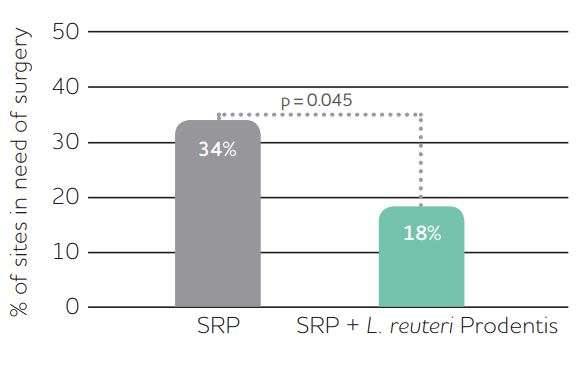
| Gingivitis | L. reuteri Prodentis reduced bleeding on probing by 85%. |
| Periodontitis | Significant reduction of pocket depth in moderate and deep pockets. 47% fewer deep pocket sites in need of surgery with L. reuteri Prodentis compared to placebo. Up to 90% reduction of pathogens with L. reuteri Prodentis. |
| Peri-Implantitis | L. reuteri Prodentis significantly reduction of bleeding on probing and probing pocket depth in implants with peri implantitis. |
| Halitosis | L. reuteri Prodentis reduces oral malodour/bad breath. |
| Oral Candida | L. reuteri Prodentis reduced the prevalence of oral Candida by more than 50% compared to placebo. |
| Caries | L. reuteri Prodentis is effective in reducing caries-associated Streptococcus mutans (S. mutans) in children. |

Oral health changes during pregnancy
During pregnancy the entire female body goes through changes and this also applies to the oral health. Due to the hormonal and immunological changes, a shift in the oral microbiome often leads to a decline in the oral health status.
If not taken care of, the imbalance can lead to dental caries, gingivitis, and periodontitis.
Pregnancy gingivitis may affect the child
Ongoing research is investigating whether there is a connection between the mother’s oral health and the health of the child. Studies have suggested that women with pregnancy gingivitis may be more likely to deliver babies prematurely or with a lower birth weight than mothers with healthy gums.
However, there are many other factors that can affect the health of a pregnant woman and her child, such as smoking, lifestyle and age.
L. reuteri Prodentis reduces pregnancy gingivitis
A double-blind, randomized, placebo-controlled study on pregnant women with gingivitis showed that supplementation of L. reuteri Prodentis significantly reduces inflammation and plaque compared to placebo.
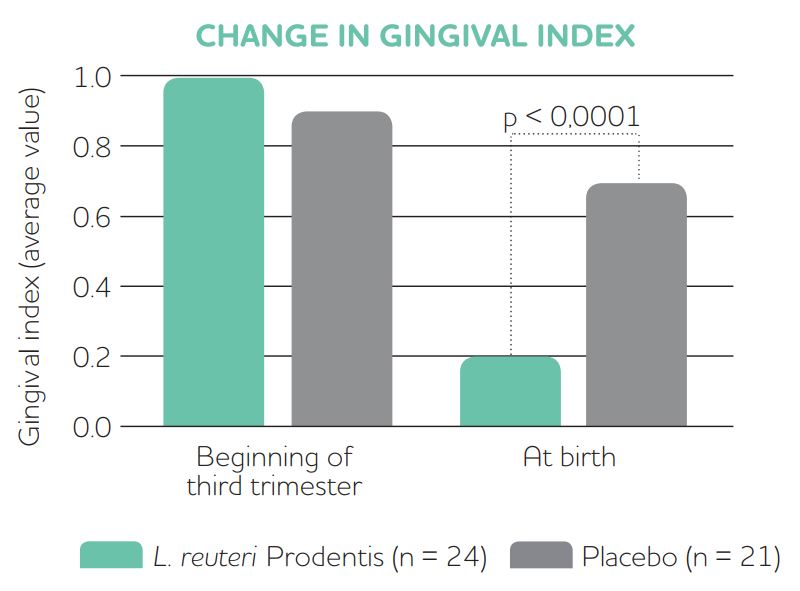

A balanced microflora is essential for a healthy gum and teeth.
Take one or two lozenges a day
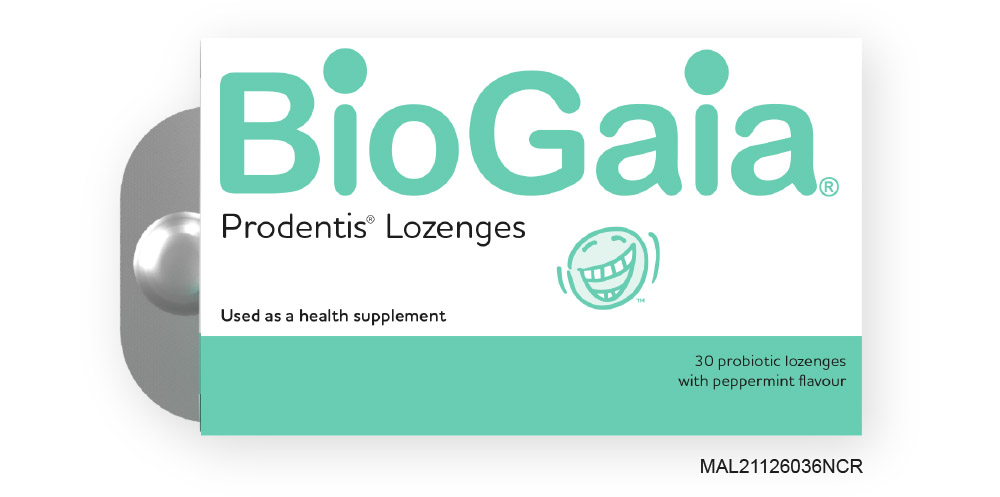
BioGaia Prodentis is safe because it is…
• clinically documented in more than 60 studies
• contains the bacterium L. reuteri Prodentis, which occurs naturally in humans
• suitable for 12 years old and above
• can be used for long periods
• does not stain teeth
• does not irritate the oral mucosa
• can also be taken during pregnancy
• does not lower the pH of your mouth

Get a free trial sample from your dentist
(whilst stocks last)
